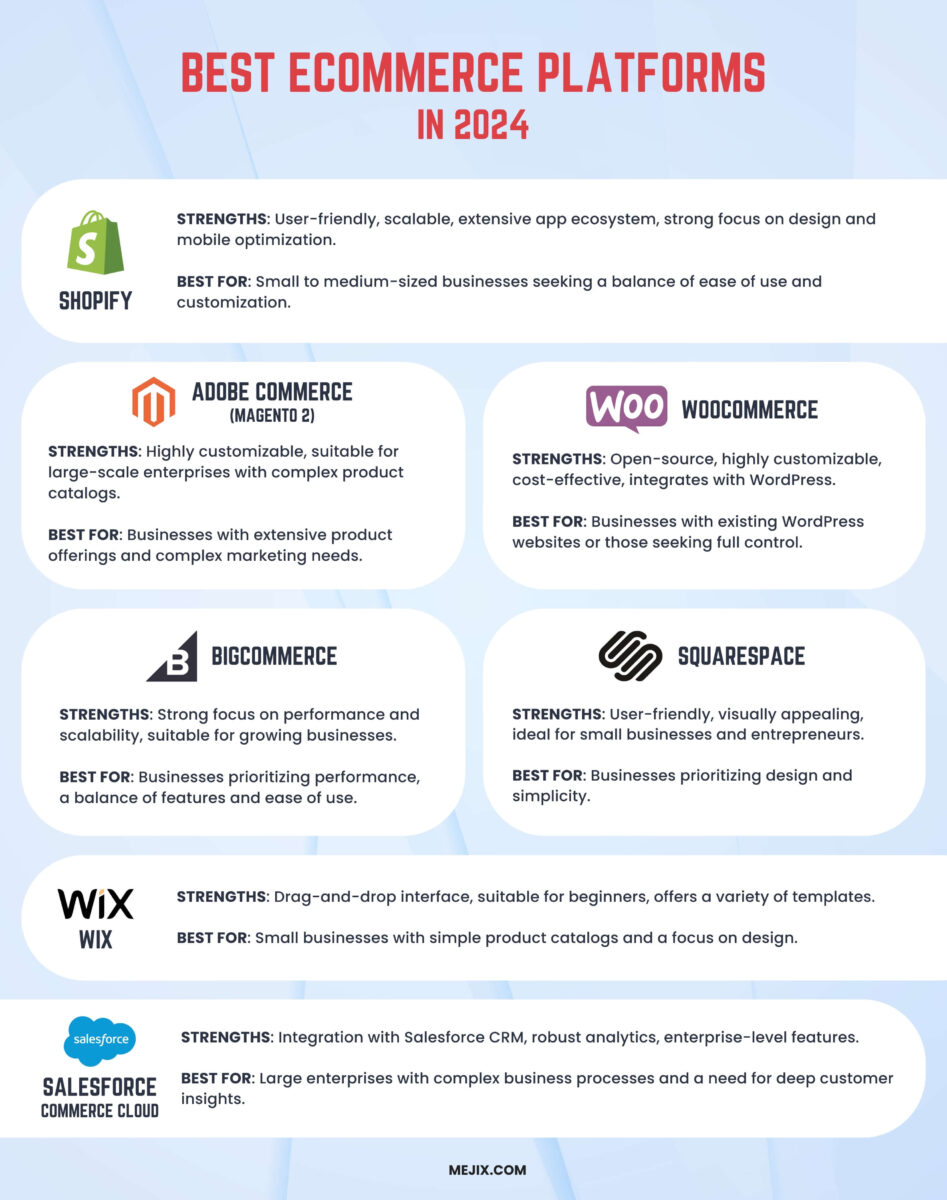Best eCommerce Platforms in 2024 – Top Choices for Your Online Business
The past few years have seen a significant shift in how people shop. As the digital marketplace continues to expand, selecting an e-commerce platform that aligns with your business goals is more important than ever.
Today, we explore some of the best eCommerce platforms in 2024, analyzing their key features, weaknesses, and potential benefits for your type of business.
Leading eCommerce Platforms in 2024

1. Shopify
Shopify is one of the most popular e-commerce platforms worldwide. It is known for its ease of use and comprehensive feature set, which caters to businesses of all sizes, from startups to large enterprises.
This one-stop e-commerce platform delivers everything you need to build an online store, from a template-based site builder to inventory management, global sales tools, marketing features, and more.
Shopify is ideal for SMBs looking for a straightforward, scalable, affordable solution with a robust ecosystem of apps and support.
Key Features
- User-Friendly Interface: Shopify’s intuitive interface makes it easy for anyone to set up and manage an online store.
- App Ecosystem: Extensive app store with plugins for every conceivable function, from SEO to inventory management.
- Responsive Themes: A wide variety of customizable and mobile-responsive themes.
- 24/7 Support: Excellent customer service is available around the clock
Cons:
Shopify has limited customization capabilities and may require additional apps or custom development to meet highly customized needs.
Another disadvantage is the transaction fees charged unless you use Shopify Payments.
Pricing: Monthly plans vary from $24 (Basic) to $2,300 (for more complex businesses).
2. Adobe Commerce (Magento 2)
Magento 2, now branded as Adobe Commerce, is a powerful platform with remarkable capabilities. Designed for developers, Adobe Commerce is highly versatile but requires advanced technical knowledge to make the most out of the platform.
Adobe Commerce suits medium to large businesses and enterprises with complex needs and product catalogs requiring advanced customization and scalability.
Key Features
- Highly Customizable: Adobe Commerce offers unparalleled customization capabilities and is perfect for custom e-commerce website development.
- Scalability: Ideal for businesses expecting high growth and large product catalogs.
- Advanced SEO & Marketing Features: Built-in SEO features help improve search engine visibility.
- Comprehensive Reporting: Detailed analytics and reporting tools to track performance.
Cons:
Adobe Commerce requires a steep learning curve and advanced technical expertise, so most businesses need a dedicated IT team to manage the online shop.
This platform comes with higher development and maintenance costs than other solutions.
Pricing: Custom pricing. Licensing costs can vary from $22,000 to $125,000.
3. WooCommerce
WooCommerce is a flexible, open-source e-commerce plugin for WordPress. It is perfect for businesses already using WordPress, those looking for a highly customizable solution, or those who want full control over their online stores.
Key Features
- Integration with WordPress: Seamlessly integrates with WordPress, making it an excellent choice for content-heavy sites.
- Customizable: Offers extensive customization options through plugins and themes.
- Cost-Effective: Free core plugin with the ability to add functionalities via paid extensions.
- Community Support: Large community and extensive documentation.
Cons:
WooCommerce requires technical expertise, needs regular updates and maintenance, and poses risk concerns if not maintained properly. Its add-on structure can make it hard to track how much you are paying for each feature.
Pricing: Custom pricing depending on hosting and add-ons.
4. BigCommerce
BigCommerce is known for its scalability and comprehensive feature set, making it a strong contender for growing businesses. It is ideal for companies looking to scale and sell across multiple channels without incurring transaction fees.
Key Features
- Multi-Channel Selling: Easily sell across various platforms, including Amazon, eBay, and social media.
- Built-In SEO Tools: Advanced SEO tools to enhance search engine visibility.
- Flexible APIs: Robust APIs for integrating with third-party applications.
- Real-Time Analytics: BigCommerce provides real-time analytics and offers access to experts who can offer advice.
Cons:
Compared to other platforms, BigCommerce offers limited theme customization. It has a slightly steeper learning curve for beginners but requires less technical knowledge than other solutions.
Pricing: Monthly plans range from $29 to $299, with custom pricing for enterprises.
5. Wix eCommerce
Wix eCommerce is a beginner-friendly drag-and-drop website builder. It is ideal for small to medium-sized businesses looking for easy-to-use, affordable e-commerce solutions.
Key Features
- Drag-and-Drop Builder: User-friendly drag-and-drop website builder.
- Variety of Templates: Wide range of attractive and customizable templates.
- Integrated Marketing Tools: Built-in marketing tools, including email marketing and social media integration.
- Secure Payment Options: Supports various payment methods with robust security features.
Cons:
Wix provides limited flexibility and customization compared to more robust platforms. While its strengths are most visible when used by small businesses, Wix is not ideal for large stores with extensive product catalogs.
Pricing: Monthly plans range from $17 to $159.
6. Squarespace Commerce
Squarespace Commerce offers a sleek and user-friendly platform with over 100 mobile-responsive templates suited for various needs. It’s an excellent solution for small businesses and startups looking for an easy-to-use solution for building eye-catching websites.
Key Features
- Design-Oriented Templates: Professionally designed templates that are easy to customize.
- Integrated E-Commerce: Seamlessly integrates with other Squarespace features.
- Mobile Optimization: Mobile-optimized designs ensure a great shopping experience on any device.
- Ease of Use: Drag-and-drop interface that is perfect for beginners.
Cons:
Squarespace has limited customization options and is not the best choice for large stores or highly complex e-commerce needs. Compared to other platforms, features like multi-currency selling, manual payments, and third-party integration are limited.
Pricing: Monthly plans range from €15 to €42.
7. Salesforce Commerce Cloud
Salesforce Commerce Cloud is designed for enterprises that need advanced e-commerce capabilities and seamless integration with other Salesforce products. It offers B2B and B2C solutions, delivering customizable customer experiences across all sales channels.
Key Features
- Omnichannel Capabilities: Provides a unified shopping experience across all channels.
- AI-Powered Personalization: Uses AI to deliver personalized shopping experiences.
- Scalable and Secure: Built to handle large-scale operations with high security standards.
- Integration with Salesforce CRM: Seamlessly integrates with Salesforce CRM and other Salesforce tools.
Cons:
Compared to other solutions, Salesforce Commerce Cloud comes at a higher cost, making it less suitable for small businesses. As with other highly customizable platforms, it requires significant technical expertise to set up and manage.
Pricing: Various plans with custom pricing.

In the world of e-commerce, there is no one-size-fits-all solution. Finding the right platform for your business depends on several factors. Consider these aspects before making a choice:
Key Features
- Scalability: Can the platform handle your business’s growth?
- Customization: Do you have specific customization needs or require complete control over your store’s design and functionality?
- Technical Expertise: Can you hire a team of experts to manage the platform, or do you need a user-friendly solution?
- Pricing: Can your budget accommodate the pricing and extra costs?
- Marketing & SEO Capabilities: Does the platform offer strong marketing & SEO features?
- Payment and Shipping Options: Is the platform compatible with your preferred methods?
- Customer Support: Does the platform offer reliable support for troubleshooting issues?
- Integration Capabilities: Is the solution compatible with other business tools?
An e-commerce platform that best aligns with your business needs, goals, and budget.
One Step Closer to eCommerce Success with Mejix
As your business grows, your e-commerce needs shift, and you might require a more robust platform or more customization options to support your expansion.
Here is where we come in. As a full stack custom software development company, we have the expertise to help you create the ultimate online store for your needs.
We work with exceptional platforms like Magento 2, Shopify, and WooCommerce to offer custom eCommerce solutions that suit your every requirement. From custom web development services to digital marketing, you can count on us for comprehensive digital solutions.
Contact us with your project needs, and let’s get started!












